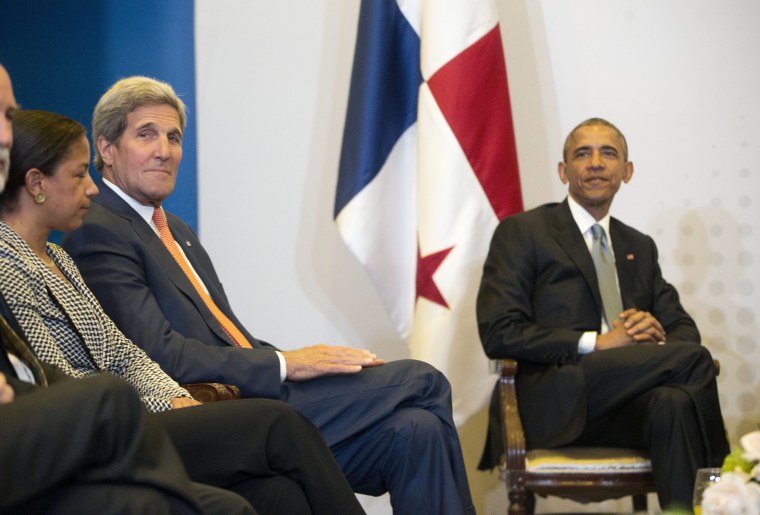A decision from the State Department that Cuba is no longer on the list of countries that support terrorism and a meeting - though largely symbolic - between President Barack Obama and Raul Castro would show how much progress has been made in U.S.-Cuba relations.
Yet behind the historic news and the image of Obama and Castro turning the page after 50 years of fights and estrangement, there are still serious differences between the United States and Cuba to be worked out.
These differences will not be easily put aside and remain an obstacle to full normalization of diplomatic relations. They also have their expression, in one way or another, at the Summit of the Americas in Panama.
The fights between groups of Cuban dissidents and those who defend Havana's regime can be seen as something anecdotal and more for the consumption of international public opinion. However, they are an expression of a fundamental problem in this new US-Cuba relationship: what about the internal political life on the island?
Does the U.S., in particular Obama, have the space to ask the Cuban government to respect the activities of its political opposition? Or will the restoration of diplomatic relations ignore that white elephant in the room that is the lack of political freedoms in Cuba?
It's hard to believe that Obama will simply hug Castro, discuss trade ties between the two countries, talk of the many American tourists who will eventually reach the island and discuss how Cuba is no longer the little pebble inside the shoe when it comes to Washington's relationship with Latin America.
No matter how warm the conversation is, Obama would have to raise the issue of Cuban domestic politics -no matter how 'interventionist' it sounds. It's not about asking for regime change in Cuba, but about space for opposition activities.
And of course, on Cuba's part there is the embargo. Castro will have every right to bring it up. There is not much Obama can do, of course; only Congress can end it by law.
An issue which may not be addressed by Obama and Castro but will be there in Panama poisoning the atmosphere is Venezuela. The U.S. and Cuba are in different corners in relation to the South American country.
Washington has imposed economic sanctions on the government of Nicolas Maduro; on the other hand Cuba is one of Venezuela's staunchest allies. (This is not only through ideological affinity but also Cuba's economic interest in receiving cheap oil from Venezuela).
One possibility is that Maduro will make a lot of noise at the Summit denouncing the U.S. "imperialist" attitude and try to convert the Venezuelan issue with Washington as a central discussion point among more than 30 heads of state and leaders of the continent.
However, what is not clear is that Cuba is interested in Venezuela contaminating their new relationship with the United States.
While it is true that Cuba is very much tied to Venezuela -it would be a nightmare if for example the cheap, daily supply of oil is interrupted - Castro would surely prefer that Maduro and company not be a wedge that prevents the final rapprochement with the United States. The Cuban view in the long term is that the relationship with Washington is more important than the one with Caracas.
The Venezuela issue also impacts Obama with respect to other Latin American leaders but in a different way than Cuba. Latin America in general has kept a shameful silence about what Venezuela has done to Maduro's political opponents; many of them are in jail.
The U.S. would wish that the continent would at least symbolically support the sanctions and criticism of Maduro's government. Latin America does not, either because they receive benefits from Venezuela, either because they do not wish to one day be the ones getting U.S. sanctions and criticism, or simply as an anti-American reaction. Whatever the case may be, the point is that it is likely that Latin Americans will say very little about Venezuela; Castro for his reasons and the other leaders for theirs.
Returning to the US-Cuba relationship, not being in the list of countries that support terrorism is not just a minor thing for the island's government. Once off the list, after Obama accepts the State Department recommendation, the U.S. Congress will have 45 days to say nothing and accept or pass a resolution opposing it. Once Cuba is off the list the countries may open embassies in both capitals and reverse a series of sanctions against the communist island, including not being able to use the US banking system and the international financial system (loans from the International Monetary Fund and similar institutions).
Obama arrives at the Summit in Panama perhaps better positioned than ever. It has not only removed the wedge that was Cuba when it comes to U.S.-Latin America relations, but also comes as he has behind him the worst of the U.S. economic downturn and is enjoying one of the most vibrant economies in the world (China and Europe are not currently going through their best moments).
This is a U.S. that remains the great North American giant for Latin America, but it does not present itself with the arrogance and absolutism of the Bush administration - "you're either with us or against us."
Not coincidentally, Obama is more popular than many leaders in their own countries, beginning in Raul Castro's Cuba.
Follow NBC News Latino on Facebook, Twitter and through our newsletter
